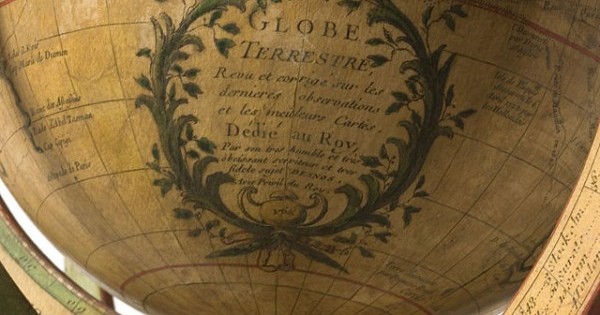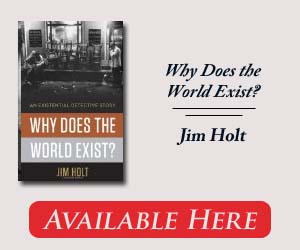
Why Does the World Exist? An Existential Detective Story, By Jim Holt, Liveright, 320 pp., $27.95
As I read this surprisingly upbeat exploration of current philosophical and scientific thought on the age-old mystery of existence itself—why, quite simply, there is something rather than nothing—a depressing question kept occurring to me. Do college students, I wondered, still sit around their dorm rooms arguing such questions into the wee hours of the morning? Or have the most recent iterations of the information revolution, from Facebook and Twitter to the newest new app, dealt a fatal blow to those philosophical bull sessions of yesteryear?
I lack the requisite social science data to confirm my worst suspicions, but an essay I read a year ago by the biographer and cultural historian Neal Gabler tends to confirm them. In his New York Times commentary, “The Elusive Big Idea,” Gabler announced the arrival of a “post-idea age.” Citing a number of the usual suspects—academic overspecialization, the disappearance of public intellectuals, the rise of a largely visual culture—he fingers them less as causes than as harbingers. “The real cause,” he says, “may be information itself.” Thanks largely to the Internet, immediate access to almost anything has made us the most informed generation in history. Yet ease of access has had a paradoxical result.
“It may seem counterintuitive that at a time when we know more than we have ever known, we think about it less,” Gabler writes. We used to gather information “to convert it into something larger than facts and ultimately more useful—into ideas that made sense of the information.” But now information is less grist for ideas than competition for them, and Gabler concludes that ideas have lost: “We prefer knowing to thinking because knowing has more immediate value. It keeps us in the loop, keeps us connected to our friends and our cohort. Ideas are too airy, too impractical, too much work for too little reward.”
There are counterarguments to such twilight pessimism. One could point out that ideas and idea-mongers have done more than their share of ill over time, particularly during the past century. A good dose of solid information is one of the best antidotes to the allure of seductive, all-explaining ideas and their offshoots, ideologies. And one could also make the case that recent innovations and innovators are worthy, if not superior, successors to the ideas and intellectuals of yore. Steve Jobs, Mark Zuckerberg, and the South by Southwest Interactive (SXSW) conferences have arguably done more good (and less harm) than all of those Left Bank and Greenwich Village intellectuals and their weighty tomes on Marxism, existentialism, and deconstructionism combined.
Still, the feeling of something missing is almost palpable. Gabler’s essay touches on what might be the real intellectual malaise of our time: an absence of consensus about the governing ideas and foundational philosophical principles that inform everything from our attitudes toward the physical and natural world to our confidence in political institutions to our respect for empirical science. The absence of governing ideas—or a general rejection or ignorance of them—is why “truthiness” prevails, why “my version of what’s true” is just as good as anybody’s version. From such thinking, a host of political, ethical, religious, and scientific (or pseudoscientific) monstrosities ensue.
Jim Holt’s Why Does the World Exist? appears at this peculiar moment of our cultural and intellectual history as a reminder that the quest for foundational truths is not only a supremely human activity but also one that brings us, if not absolute truth (which may be unknowable), at least better and better approximations of the truth. Such approximations offer the possibility of a restored consensus that allows for passionate disagreements within reasonable and civil bounds. But only the possibility. The complexity of the new philosophical and scientific thinking poses demands on attention, imagination, and concentration to which our fast-moving media are hardly conducive.
More’s the pity, because we have arrived at an interesting point where the investigation of our minds, our consciousness, is closely bound up with the study of physical reality, the world out there, the universe (or multiverse). The long-separated fields of physical and biological science, epistemology, metaphysics, and even ethics appear to be in closer conversation and possibly moving toward convergence, where is may prove to be connected to ought. Holt dramatizes this moment by focusing on the largest and most unifying of philosophical questions and by introducing us to some of the main participants in the current conversation. A gifted essayist and critic whose explications of science, mathematics, and philosophy appear in The New York Review of Books and The New Yorker, among other places, Holt also intersperses his intellectual investigation with brief but revealing glimpses of his own life, including the death of his mother, when existential musings on the nature of being seem anything but abstract.
Holt’s guiding premise here comes from the great 17th-century philosopher Baruch Spinoza: “Of all the possible resolutions to the mystery of existence,” Holt writes, “perhaps the most exhilarating would be the discovery that, contrary to all appearances, the world is causa sui: the cause of itself.” For Spinoza, all mental and physical existents were temporally modified expressions of a single substance, an infinite substance that he called God or Nature. Albert Einstein embraced Spinoza’s idea that the world was divine and self-causing, as more recently have other “metaphysically inclined physicists” like Sir Roger Penrose and the late John Archibald Wheeler. Such scientists go even further, proposing that human consciousness has a critical role in the world’s self-creation. “Although we seem to be a negligible part of the cosmos,” Holt writes in summary of these ideas, “it is our consciousness that gives reality to it as a whole.”
 But before coming to those thinkers, Holt addresses the logical and ontological questions surrounding nothingness and the possibility that something can come out of it. Logical or not (and according to “universally free logic,” it is logically possible), the ex nihilo argument receives a spirited thrashing from University of Pittsburgh philosopher of science Adolf Grünbaum, a Magoo-like character who subjects Holt to a near-death experience while driving him to a bibulous dinner at a restaurant overlooking the city. In Grünbaum’s view, the ex nihilo idea is yet another pointless attempt to explain what needs no explanation—and worse, a harmful intellectual residue of religious, and specifically Christian, thinking to which even atheistic scientists such as Richard Dawkins succumb. Existence is no mystery if you dispose of unnecessary presuppositions, Grünbaum insists, but his certainty only heightens Holt’s conviction that it can’t be the last word.
But before coming to those thinkers, Holt addresses the logical and ontological questions surrounding nothingness and the possibility that something can come out of it. Logical or not (and according to “universally free logic,” it is logically possible), the ex nihilo argument receives a spirited thrashing from University of Pittsburgh philosopher of science Adolf Grünbaum, a Magoo-like character who subjects Holt to a near-death experience while driving him to a bibulous dinner at a restaurant overlooking the city. In Grünbaum’s view, the ex nihilo idea is yet another pointless attempt to explain what needs no explanation—and worse, a harmful intellectual residue of religious, and specifically Christian, thinking to which even atheistic scientists such as Richard Dawkins succumb. Existence is no mystery if you dispose of unnecessary presuppositions, Grünbaum insists, but his certainty only heightens Holt’s conviction that it can’t be the last word.
Many other words follow, including those of the Oxford physicist David Deutsch, who relatively early in his career realized Richard Feynman’s ambition to demonstrate the theoretical feasibility of a computer capable of simulating any physically possible reality—a universal quantum computer. Like some quantum theorists, Deutsch embraces the many-worlds interpretation of physicist Hugh Everett, who holds that the universe is just one of many alternate universes that interact and produce weird quantum phenomena. The only thing giving order to such a reality, whose physical structures vary randomly across the “multiverse,” is the human mind, because, as Holt paraphrases Deutsch, the “knowledge-bearing structures—embodied in physical minds—arise from evolutionary processes that ensure they are nearly identical across different universes.”
Deutsch, we learn, has a way of standing back from almost any question and seeing it from a slant angle, or from somewhere apart from a more classically ordered universe: “The idea that things are always caused by things that come before them in time has nothing to do with logic or explanation as such,” Deutsch muses. “You could imagine an explanation where something was caused by things happening at all different times, past and future.” Even the definitions of explanations change, Deutsch says: “We’re bootstrapping our way toward better and better explanations. And that’s why we can never have an ultimate explanation. Anything pretending to be an ‘ultimate’ explanation would be a bad explanation, because there would be nothing left over to explain why it was the right one—to explain why reality was that way and not another way.”
Since the British scientist Michael Faraday proposed in the mid-19th century that physical reality consists not of matter but of fields, scientific advances have progressively “dematerialized” nature, revealing structure instead of stuff at each deeper level of explanation. Under the new understandings, reality is “one great relational web,” which itself might be described as information. States of the universe, as the British astrophysicist Sir Arthur Eddington and others have insisted, are pure information states, in which the flux of differences (in the distribution of mass/energy, for example, or in the charge of a particle) occurs.
In this new picture of reality, Holt shows, scientists and philosophers increasingly assert a more determinative role for human consciousness. Some (the Australian philosopher David Chalmers, for one) propose that it is a force unto itself, like gravity, and even that “the fundamental stuff of reality is mind-stuff,” which we humans come to know indirectly through science and directly through introspection.
But what brings being into being, whatever it ultimately consists of ? Holt keeps returning to the question. And he comes across the boldest answer (itself a restatement of one of the oldest philosophical answers) in the work of Canadian cosmologist John Leslie. Like Plato, Leslie believes that reality is determined by value—the Good. This value determines which reality among a “necessarily existing realm of possibilities” will spring into being. Leslie’s explanation rates as both the most far-fetched and the most weirdly plausible of any put forth by the thinkers in this book.
“We tend to think,” Holt writes,“that value can bring something into existence only with the aid of some mechanism—as Leslie put it, ‘some combination, perhaps, of pistons pushing, electromagnetic fields tugging, or persons exerting willpower.’ But such a mechanism could never explain the existence of a world. It could never explain why there is Something rather than Nothing, because it would be part of the Something to be explained.”
The notion that the ethical need for something can by itself summon that thing into being is called axiarchism, and it closes a philosophical loop not just with Plato but also with Spinoza. That doesn’t make it true, of course. But axiarchism underlines one of the deeper points of Holt’s book: that the most serious recent scientific and philosophical delvings into the nature of reality need not lead us to the easy relativism we associate with truthiness, a relativism grounded in an empty, outdated materialism that even religious fundamentalists embrace when they try to make religious texts function like scientific ones. Recent scientific and philosophical inquiry can lead us back, logically and demonstrably, to the possibility of immanent absolutes, of which the most efficacious may be the Good. A useful lesson for our muddled times.

